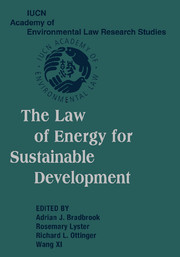Book contents
- Frontmatter
- Contents
- Acknowledgments
- Message from Kofi A. Annan, Secretary-General, United Nations
- Introduction – A Global Learned Society to Address Earth's Evolution: The IUCN Academy of Environmental Law
- Public Lectures on International Environmental Law
- PART ONE SUSTAINABLE DEVELOPMENT AND THE ROLE OF ENERGY LAW
- PART TWO LEGAL ISSUES IN CONTEMPORARY ENERGY LAW
- PART THREE INTERNATIONAL ENERGY LAW
- 11 International Law and Global Sustainable Energy Production and Consumption
- 12 Policy Options
- 13 Financing Energy for Sustainable Development
- 14 The Clean Development Mechanism and UNFCCC / Kyoto Protocol Developments
- 15 The Report of the World Commission on Dams: Some Implications for Energy Law
- 16 International Issues for Sustainable Development: IUCN Perspective
- 17 Enhanced Implementation and Enforcement of International Environmental Laws by the Judiciary
- PART FOUR COMPARATIVE ENERGY LAW
- PART FIVE ELECTRICITY RESTRUCTURING
- PART SIX FINANCING FOR SUSTAINABLE ENERGY
- PART SEVEN CIVIL SOCIETY AND THE PROCEDURAL REQUIREMENTS OF ENERGY LAW FOR SUSTAINABLE DEVELOPMENT
- Index
14 - The Clean Development Mechanism and UNFCCC / Kyoto Protocol Developments
Published online by Cambridge University Press: 10 August 2009
- Frontmatter
- Contents
- Acknowledgments
- Message from Kofi A. Annan, Secretary-General, United Nations
- Introduction – A Global Learned Society to Address Earth's Evolution: The IUCN Academy of Environmental Law
- Public Lectures on International Environmental Law
- PART ONE SUSTAINABLE DEVELOPMENT AND THE ROLE OF ENERGY LAW
- PART TWO LEGAL ISSUES IN CONTEMPORARY ENERGY LAW
- PART THREE INTERNATIONAL ENERGY LAW
- 11 International Law and Global Sustainable Energy Production and Consumption
- 12 Policy Options
- 13 Financing Energy for Sustainable Development
- 14 The Clean Development Mechanism and UNFCCC / Kyoto Protocol Developments
- 15 The Report of the World Commission on Dams: Some Implications for Energy Law
- 16 International Issues for Sustainable Development: IUCN Perspective
- 17 Enhanced Implementation and Enforcement of International Environmental Laws by the Judiciary
- PART FOUR COMPARATIVE ENERGY LAW
- PART FIVE ELECTRICITY RESTRUCTURING
- PART SIX FINANCING FOR SUSTAINABLE ENERGY
- PART SEVEN CIVIL SOCIETY AND THE PROCEDURAL REQUIREMENTS OF ENERGY LAW FOR SUSTAINABLE DEVELOPMENT
- Index
Summary
INTRODUCTION
Of the three flexible mechanisms created under the Kyoto Protocol to the United Nations Framework Convention on Climate Change (UNFCCC), the Clean Development Mechanism (CDM) has generated the most interest. This is due to at least two reasons: (a) the eligibility of nonAnnex I Parties (mostly developing country parties) to participate in CDM project activities as host countries; and (b) the fact that it is the only mechanism for which credits can be earned prior to the beginning of the first commitment period (2008 to 2012).
For many people, the CDM connotes a potential source of funding for projects in the energy and forestry sectors. While this is true, the statement needs to be qualified in many ways. Project developers should realize that many conditions attach to a CDM project activity, which could affect the expected revenues to be derived from the project.
THE CDM: A FEW BASIC CONCEPTS
The CDM has two purposes: For non-Annex I Parties, the CDM is meant to assist in achieving sustainable development and in contributing to the ultimate objective of the Convention, i.e., stabilization of greenhouse gas concentrations in the atmosphere at a level that would prevent dangerous anthropogenic interference with the climate system.On the other hand, the CDM aims to assist Annex I Parties (developed country Parties) in achieving compliance with their quantified emission limitation and reduction commitments (QELRCs), set out in Article 3 of the Kyoto Protocol, in relation to its Annex B.
The way in which the second objective can be achieved, as illustrated in a simple way, is this: A project activity is located in a nonAnnex I country (known as the “host country”).
- Type
- Chapter
- Information
- The Law of Energy for Sustainable Development , pp. 231 - 236Publisher: Cambridge University PressPrint publication year: 2005
- 2
- Cited by

